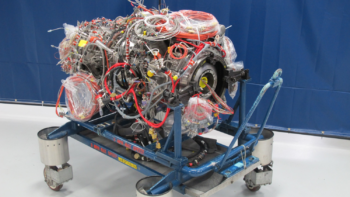PENTAGON: Saddled with dozens of broken missile motors worth $53 million, the Air Force put the defective equipment to the side to wait for eventual repair. Things changed quickly however when earlier this year a private auditor hired by the Pentagon took a closer look and discovered that the motors were in fine working condition — they had just been mislabeled.
The motors were just one of more than 2,000 problems uncovered by the Defense Department’s first-ever audit released late Thursday night. The sweeping study was conducted by a slew of private auditing firms at a cost of $431 million, and found a litany of irregularities so pervasive that each of the armed services failed. As they were expected to.
“We never thought we were going to pass an audit, right? Everyone was betting against us that we wouldn’t even do the audit,” Deputy Defense Secretary Patrick Shanahan told reporters Thursday.
The good news, according to Pentagon comptroller David Norquist, is that the Pentagon was able to account for all of its ships, planes, vehicles and drones during the audit process, but he warned that the audit wasn’t a one-time shot.
The bad news? The Army, Navy, Air Force, Marines, Special Operations and Transportation commands all failed the audit. While Pentagon leaders readily admit they harbored no illusions they would pass their first ever audit almost 30 years after Congress first directing the audit to happen, that failure is a huge problem.
“If you’re not fixing it, the auditors will come back in exactly a year and find you didn’t fix it,” Norquist told a small group of reporters at the Pentagon before the report’s release. “And they’re going to come the next year, and the next year until you fix it….so each year I’ll be able to tell you how many findings we closed.”
There were no instances of fraud uncovered during the audit, but the points of failure that were found are deeply worrying to Pentagon leadership, partially for where they were found.
“Our single largest number of findings is IT security around our businesses,” Norquist said, warning that the problem is larger than the bland language of the audit might let on. “This is a significant number, and it reflects the challenges that the department faces in IT security. Although it will show up in the report as a single material weakness and therefore might not stand out, from our perspective it drew the most findings that caused it to be a material weakness.”
Under Mattis, Pentagon leaders have made a push to get internal networks cleaned up, and to nudge defense contractors to clean up their own houses under threat of losing business with the department.
And Congress, after waiting almost three decades for the Pentagon to conduct an audit, is paying attention.
The outgoing head of the House Tactical Air and Land Forces, Republican Mike Turner, said Thursday night that Congress knew “the outcome would paint a bleak picture of the financial controls and information systems at the Department of Defense,” but “now that we have a clearer picture of the failures at the DoD, we can take action to fix them, hold leadership at DoD accountable.”
The presumptive incoming chair of the House Armed Services Committee, Democrat Adam Smith, said “it is essential that we get the Defense Department to a position where Congress, taxpayers, and DOD itself can track and account for the money that is being used. The results in this report show exactly why it is so important that we continue to press forward with that effort.”
Approximately 1,200 auditors conducted over 900 site visits at 600 locations including military bases, depots and warehouses, at a cost of $413 million to the Pentagon.
The issue of the 71 missile motors worth $53 million matters, however. Norquist highlighted the issue to prove his point that the audit is key to fulfilling Defense Secretary Jim Mattis directive to improve the readiness of the force. “This is the type of finding that I think is most directly relevant to readiness,” he said. “This is something that will be a priority in the near-term.”
But as he admitted, “We didn’t pass.”
Questions hang over UK’s new, ambitious defense spending plan: Analysts
Such is the scale of British Army acquisition problems alone that they could not be resolved if the UK moved to a long term spending settlement of even 4 percent GDP, an expert told British lawmakers.



























